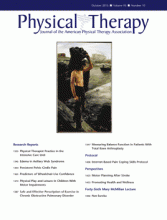Abstract
Background There are no predictive models of wheelchair-use confidence. Therefore, clinicians and researchers are limited in their ability to screen for and identify wheelchair users who may be more prone to low wheelchair-use confidence and may benefit from clinical intervention.
Objective The purpose of this study was to identify health-related, personal, and environmental factors that predict perceived wheelchair-use confidence in community-dwelling adults who use manual wheelchairs.
Design A cross-sectional study was conducted.
Methods Community-dwelling manual wheelchair users (N=124) were included in the study if they were ≥50 years of age, had ≥6 months of wheelchair use experience, and had no cognitive impairment. The Wheelchair Use Confidence Scale was used to assess wheelchair-use confidence. The sociodemographic information form, Functional Comorbidity Index, Seating Identification Tool, Interpersonal Support and Evaluation List, and Home and Community Environment Instrument captured the independent variables. Blocks of health, personal, and environmental variables were sequentially entered into the regression model.
Results Five personal variables (age, standardized beta [β]=−0.18; sex, β=−0.26; daily hours of wheelchair occupancy, β=0.20; wheelchair-use training, β=0.20; and wheelchair-use assistance, β=−0.34) and one environmental variable (need for seating intervention, β=−0.18) were statistically significant predictors, explaining 44% of the confidence variance.
Limitations The sample comprised volunteers and, therefore, may underrepresent or overrepresent particular groups within the population. The study's cross-sectional research design does not allow for conclusions to be made regarding causality.
Conclusion Older women who use wheelchairs and who require assistance with wheelchair use may have low wheelchair-use confidence. The same is true for individuals who have no formal wheelchair-use training, who are in need of a seating intervention, and who report few hours of daily wheelchair use. These wheelchair users may require clinical attention and benefit from intervention.
Footnotes
All authors provided concept/idea/research design. Dr Sakakibara, Dr Eng, and Mr Routhier provided writing. Dr Sakakibara and Mr Routhier provided data collection and participants. Dr Sakakibara provided data analysis and project management. Dr Sakakibara, Dr Miller, and Mr Routhier provided fund procurement. Dr Miller and Mr Routhier provided facilities/equipment. Dr Sakakibara, Dr Miller, and Dr Backman provided consultation (including review of manuscript before submission).
The ethics boards of all participating sites approved the study.
This work was supported by the Canadian Institutes of Health Research (Doctoral Scholarship to Dr Sakakibara and Operating Grant IAP-107848) and the Michael Smith Foundation for Health Research (Senior Scholar Award to Dr Eng).
- Received November 24, 2014.
- Accepted April 22, 2015.












